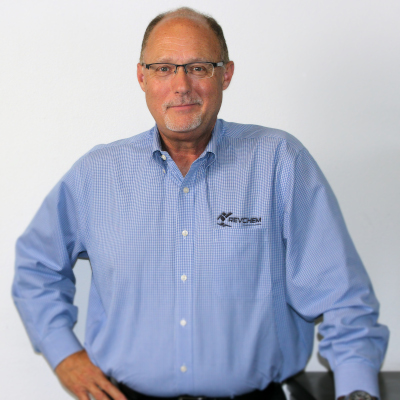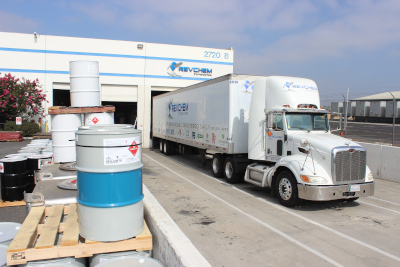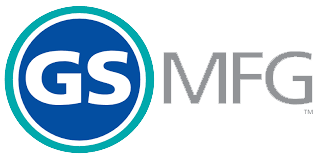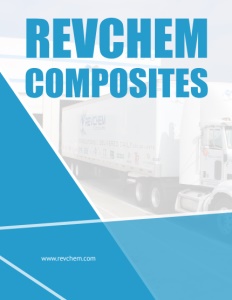Revchem Composites
Composite solutions delivered daily
Business View Magazine interviews the President of Revchem Composites, Pete Pendleton, about his company’s success to date.
For more than four decades, Revchem Composites has helped composite fabricators improve their processes, re-engineer their parts, and grow their businesses in an ever-evolving industry. It all began in 1975 in Costa Mesa, California, when Doug and Gina Dennis started their distribution company known as Revchem Plastics. That first day of operations, they sold two pails of black Gel Coat.
In 1976, Revchem opened Dura Technologies, Inc., a producer of exceptional surface coatings for high performance composites, thus expanding both companies’ reach to new markets in the specialty products marketplace. Today, Revchem is still a family business, with six locations along the U.S. west coast, a fleet of trucks, and more than 100 orders processed every day.

Pete Pendleton, President
Recently, Business View Magazine spoke with the President of Revchem Composites, Pete Pendleton, about his company’s success to date, and what the future holds for Revchem and the composites industry as a whole. The following is an edited transcript of that conversation:
BVM: What was the vision when Revchem was founded?
Pendleton: “In the 1970s, composites were essentially fiberglass products and supplies; an economical, efficient way to manufacture very intricate shapes that you couldn’t do back then with steel or aluminum or wood. The Chevrolet Corvette is a testament to that, built from fiberglass to be lighter, stronger, faster. Doug Dennis had a vision that the composites industry was going to escalate in demand and popularity, so he started Revchem Composites as a supplier to composites manufacturers for boats, tub showers, airplanes, motorcycle fairings, surfboards, and general fabrication.
“From the first location in Costa Mesa, it grew to Anaheim, and then they built facilities in Bloomington, California, where we’ve been since 1991. Revchem is purely a distribution company. We buy materials from different composite manufacturers – resin companies, reinforcements, core materials, etc., and we distribute them to the industry, so people can build their products. Also located at the Bloomington site is our Dura Technologies company that blends base resins and epoxies into ready-to-use products. We manufacture gel coats and coatings for the composites industry there and Revchem distributes them, in addition to products we buy from others.”
BVM: Can you give us an overview of present-day operations?
Pendleton: “We currently have about 100 employees, and distribution centers in Costa Mesa, San Fernando, Stockton (northern California), and two in the Pacific northwest. We’re actually merging those facilities in Tualatin, Oregon and Tacoma, Washington into one large distribution center in Tumwater, Washington to service both markets. That project is in progress and should be finished by the end of summer 2018. So, every day we’ll be going north from Tumwater into the Greater Tacoma and Seattle markets, and south to composite manufacturers in the Greater Portland markets.
“Ninety-five percent of our product is delivered on our company-owned, semi-trailer trucks. We are strictly a west coast distributor, servicing all of southern and northern California, Las Vegas, northern Nevada, Lake Havasu City in Arizona, and the general Portland and Seattle-Tacoma geographic areas. We also do a bit of export to specialty places, and ship to some businesses that manufacture in Mexico and have a U.S. presence. Or we take it to the border and they use a customs agent and broker to get it across.”
BVM: Who are your typical customers?
Pendleton: “One thing that really helps our stability and growth is the diversity we have in the marketplace. We’re servicing the marine industry, set design and special effects in the movie industry, aerospace, tub shower, surfboards, general fabrication, and others – because of that diversity we were able to survive the recession of 2008, quite well. Even though everything was down, we weren’t dependent on any one segment. That remains the same today because, as we move forward, we service such a diverse group of industries.
“Another unique fact about Revchem is, even if you include our top five or ten customers, no single customer makes up over three percent of our total business. Our primary customers are mid-size to small operations. We process between 100 and 150 orders a day and deliver those on our truck fleet. The average order size is around $1,500 to $20,000, and we certainly have some larger $25,000 to $30,000 orders, but the daily average order size, times the footprint, is what saves us. We have such diversity in our customer base, and so many customers, that we don’t feel at risk if a large customer was to have a catastrophic shutdown or something else was to happen. It doesn’t impact our revenue all that hard.”
BVM: How do you differentiate your business from competitors?
Pendleton: “We have two large national competitors. One is the largest composites distributor in our industry. They are at least 20 times our size and have more than 30 distribution points across the country. The other is owned by Interplastic Corporation and probably five times our size, with a much larger footprint.
 “In both cases our business model is different, and we pride ourselves on ‘order today, deliver tomorrow.’ We’re not always the lowest priced, but we offer the most service – meaning you can order at 4 PM, and if you need it by 6 AM, there’s a high likelihood it will be there. We have a high first-pass fill rate (96 – 97 %) and tremendous technical support. Our 13 field salespeople are well-trained to help manufacturers deal with technical resource issues, understand laminate schedules, sort through issues related to building the products. So, quick delivery, good inventory, high tech support, and we deliver when customers ask, not when it’s scheduled for their area, which is a different business model than the competition.”
“In both cases our business model is different, and we pride ourselves on ‘order today, deliver tomorrow.’ We’re not always the lowest priced, but we offer the most service – meaning you can order at 4 PM, and if you need it by 6 AM, there’s a high likelihood it will be there. We have a high first-pass fill rate (96 – 97 %) and tremendous technical support. Our 13 field salespeople are well-trained to help manufacturers deal with technical resource issues, understand laminate schedules, sort through issues related to building the products. So, quick delivery, good inventory, high tech support, and we deliver when customers ask, not when it’s scheduled for their area, which is a different business model than the competition.”
BVM: Where do relationships with vendors and networking fit into the grand scheme of growth?
Pendleton: “Our vendor partner relationships are most important to us, because without them Revchem couldn’t exist. We’d have nothing to sell. We have long, 40-year-plus standing relationships with most of the well-known industry product manufacturers and we really focus on the fact that it’s a partnership. That’s at the core of our thinking. We send out a Top 10 Vendor Partner awards recognition system at the end of every year and let them know how they did, their fill rates, their on-time performance, and we get great feedback.
“We have alliances with several associations: ACMA (American Composites Manufacturers Association; SAMPE (Society for the Advancement of Material and Process Engineering) AMMA (American Marine Manufacturers Association); SEMA (Specialty Equipment Marketing Association). And we attend a lot of annual trade shows including: CAMEX, SAMPE, SEMA in Las Vegas, and an event specifically targeted at the surfboard market called ‘The Board Room’, which is held every May at the Del Mar Fairgrounds near San Diego.”
BVM: Do you have any expansions, technology upgrades, or green initiatives in the works?
Pendleton: “Last year, we replaced the old, non-robust ‘Genesis’ business software that had been in-house since 1991 with an ERP system called SYSPRO. Like any large-scale software implementation, there’s some risk, but it went live pretty seamlessly. We’re up and running 100 percent and continuing to refine and learn how to best utilize it.
“We’re working with AOC and Interplastic, two large resin manufacturers, and talking a lot about environmentally-friendly resins. That’s pushing the technology – it’s moving slowly, but in the sights. A more environmentally-conscious approach is using epoxies that don’t emit VOCs into the atmosphere. About 25 percent of surfboard manufacturers are using epoxy in boards rather than just plain fiberglass or polyester resin. There’s also a move to recycling of composite materials, including grinding them up for use as other materials. There was a big effort by the Surf Rider Foundation in southern California last year to collect old surfboards and recycle them.
“Carbon fiber is growing very rapidly in popularity and use. It’s become one of those things that offers far superior reinforcement over traditional fiberglass. We’ve been seeing more and more use of carbon fiber in the automotive sector over the last 10 to 15 years and that sector will definitely continue to grow.”
BVM: What are Revchem’s objectives for the future?
Pendleton: “We have a very specific vision and growth plan in front of us. We’re hoping to double the size of the business within the next five years. Our ownership is very supportive, with family members actively working within the company. Growth comes in Revchem from three areas: We can take market share from our competitors; we can add new products to our offering; or we can grow our footprint by adding distribution centers and geographic coverage. Frankly, we’re working on all three of those all the time.”
Check out this handpicked feature on Tidewater Homes – A boutique builder.
AT A GLANCE
WHO: Revchem Composites
WHAT: Composites materials distributor
WHERE: Bloomington, CA
WEBSITE: www.revchem.com





